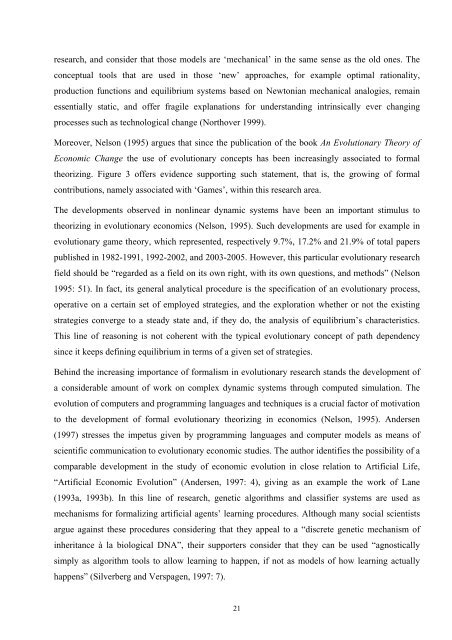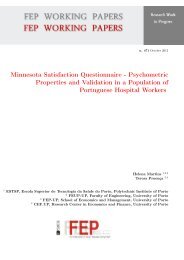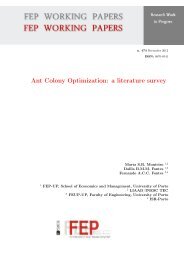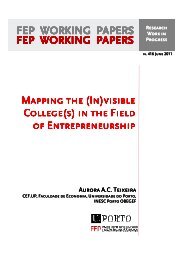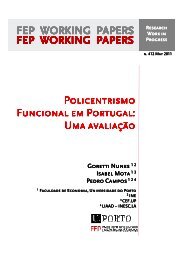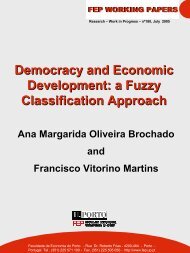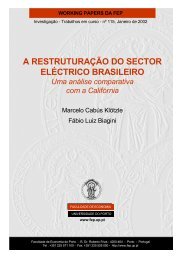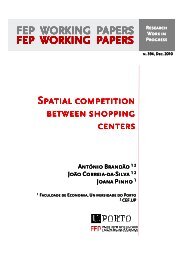Capa wps - FEP - Working Papers - Universidade do Porto
Capa wps - FEP - Working Papers - Universidade do Porto
Capa wps - FEP - Working Papers - Universidade do Porto
You also want an ePaper? Increase the reach of your titles
YUMPU automatically turns print PDFs into web optimized ePapers that Google loves.
esearch, and consider that those models are ‘mechanical’ in the same sense as the old ones. The<br />
conceptual tools that are used in those ‘new’ approaches, for example optimal rationality,<br />
production functions and equilibrium systems based on Newtonian mechanical analogies, remain<br />
essentially static, and offer fragile explanations for understanding intrinsically ever changing<br />
processes such as technological change (Northover 1999).<br />
Moreover, Nelson (1995) argues that since the publication of the book An Evolutionary Theory of<br />
Economic Change the use of evolutionary concepts has been increasingly associated to formal<br />
theorizing. Figure 3 offers evidence supporting such statement, that is, the growing of formal<br />
contributions, namely associated with ‘Games’, within this research area.<br />
The developments observed in nonlinear dynamic systems have been an important stimulus to<br />
theorizing in evolutionary economics (Nelson, 1995). Such developments are used for example in<br />
evolutionary game theory, which represented, respectively 9.7%, 17.2% and 21.9% of total papers<br />
published in 1982-1991, 1992-2002, and 2003-2005. However, this particular evolutionary research<br />
field should be “regarded as a field on its own right, with its own questions, and methods” (Nelson<br />
1995: 51). In fact, its general analytical procedure is the specification of an evolutionary process,<br />
operative on a certain set of employed strategies, and the exploration whether or not the existing<br />
strategies converge to a steady state and, if they <strong>do</strong>, the analysis of equilibrium’s characteristics.<br />
This line of reasoning is not coherent with the typical evolutionary concept of path dependency<br />
since it keeps defining equilibrium in terms of a given set of strategies.<br />
Behind the increasing importance of formalism in evolutionary research stands the development of<br />
a considerable amount of work on complex dynamic systems through computed simulation. The<br />
evolution of computers and programming languages and techniques is a crucial factor of motivation<br />
to the development of formal evolutionary theorizing in economics (Nelson, 1995). Andersen<br />
(1997) stresses the impetus given by programming languages and computer models as means of<br />
scientific communication to evolutionary economic studies. The author identifies the possibility of a<br />
comparable development in the study of economic evolution in close relation to Artificial Life,<br />
“Artificial Economic Evolution” (Andersen, 1997: 4), giving as an example the work of Lane<br />
(1993a, 1993b). In this line of research, genetic algorithms and classifier systems are used as<br />
mechanisms for formalizing artificial agents’ learning procedures. Although many social scientists<br />
argue against these procedures considering that they appeal to a “discrete genetic mechanism of<br />
inheritance à la biological DNA”, their supporters consider that they can be used “agnostically<br />
simply as algorithm tools to allow learning to happen, if not as models of how learning actually<br />
happens” (Silverberg and Verspagen, 1997: 7).<br />
21


